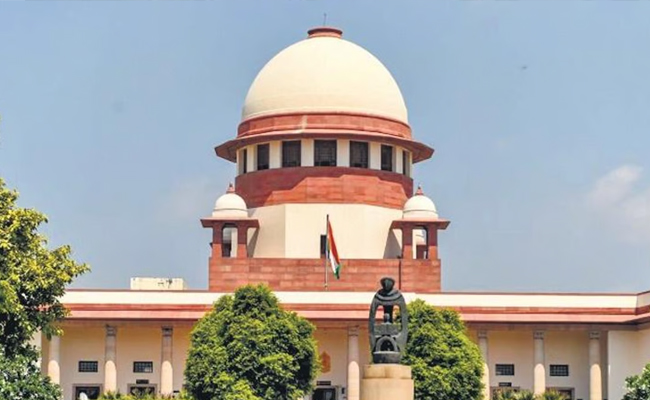New Delhi (PTI): The Supreme Court on Thursday framed eight key questions for adjudication of the dispute between the Tamil Nadu government and Governor R N Ravi over withholding assent to bills passed by the legislative assembly. These include questions on the concept of pocket veto, the governor's authority and discretion.
The posers were framed by a bench comprising Justices J B Pardiwala and R Mahadevan that is hearing the submissions of senior advocate Rakesh Dwivedi representing the Tamil Nadu government.
The hearing is underway.
The bench listed the questions at the outset of the day’s proceedings.
The first one, for instance, reads, “When a state legislative assembly passes a bill and sends it to the Governor for assent, and the Governor withholds assent, but the bill is passed again and resubmitted – does the Governor have the authority to withhold it once more?”
The next question is: “Is the discretion of the governor to present a bill to the President limited to specific matters, or does it extend beyond certain prescribed subjects?”
The bench said it will deal with the issue on what considerations influenced the governor’s decision to present the bill to the president instead of granting assent.
“What is the concept of a pocket veto, and does it find a place within the constitutional framework of India,” reads another question.
The bench said it will deal with the issue of how to interpret Article 200 of the Constitution, which gives the governor the power to approve or withhold approval of bills passed by the state legislature. The governor can also send a bill back to the legislature for reconsideration or suggest changes.
“When a bill is presented to the Governor and returned for reconsideration, does the Governor have an obligation to grant assent once the bill is passed again by the legislature,” the bench asked.
It will hear Attorney General R Venkataramani on the matter later in the day.
The bench is hearing two petitions filed by the Tamil Nadu government concerning the prolonged confrontation between the state assembly and the governor over his refusal to assent to bills passed by the legislature.
Let the Truth be known. If you read VB and like VB, please be a VB Supporter and Help us deliver the Truth to one and all.
Shillong (PTI): As the Meghalaya High Court pulled up the state government over the disappearance of over 4,000 tonnes of coal, a minister on Monday claimed that heavy rain in the state might have washed it away.
The high court has directed the state government to take action against officials under whose watch the coal went missing.
Speaking to reporters, Excise Minister Kyrmen Shylla said, "Meghalaya receives the highest rainfall. You never know... because of rain, the coal might have swept away. Chances are very high."
The high court had on July 25 pulled up the state government over the vanishing of coal from Rajaju and Diengngan villages and instructed it to trace those responsible for lifting the coal illegally.
The minister, however, clarified that he was not trying to justify the disappearance, and admitted there was no conclusive evidence yet to determine whether the loss was due to natural causes or any illegal activity. "I cannot blame just the rain. It could be or it could not be. I really don't have any kind of details," he said.
He asserted that any activity related to coal mining or transportation must be done in accordance with the law and that authorities must ensure illegal practices are curbed.
On allegations of ongoing illegal coal mining and transport in the state, Shylla said concrete evidence was needed to establish such claims and that multiple departments were responsible for monitoring such activities.
"But I believe that our people, if it is for survival, might do it illegally... otherwise nobody wants to do anything that can harm the state," he said.
He expressed optimism that people would abide by the law, especially after the government's announcement of scientific mining.
"We all are happy to welcome it, and we want to see the light of day with this. I believe our people will not do anything that gives the court or law a chance to point fingers at us," he added.
The ban on coal mining and transportation in Meghalaya was imposed by the National Green Tribunal (NGT) in 2014, citing rampant unregulated and unsafe mining practices, especially the controversial 'rat-hole' mining technique prevalent in the state.
The tribunal's order came in the wake of mounting concerns over environmental degradation, water contamination, and frequent fatalities in the hazardous mines, particularly in East Jaintia Hills.
On a separate note, the minister also responded to complaints over the dust and debris caused by the ongoing construction along National Highway 6 in East Jaintia Hills, saying, "I appreciate this government for the initiative. For now, it is difficult, but once everything is completed, we will enjoy the benefits."



